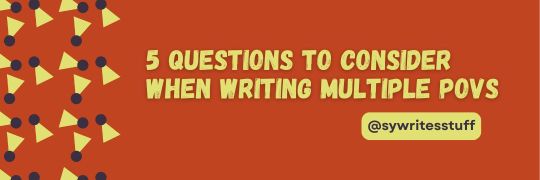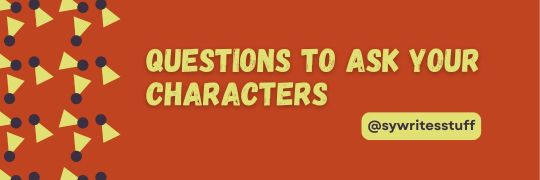Text

I'm currently writing a novel told from two characters' perspectives, and it's been a struggle! Sometimes I wonder if both of them sound distinct enough. Other times, I wonder if it'd be better to stick to one point of view altogether.
While I've heard a lot of advice encouraging first-time authors to stick to a single POV, I believe that decision ultimately depends on the story you want to tell. These are some questions I always return to, which have helped me progress through each chapter! (I'm also close to reaching 35k words on this first draft! Wahoo!!)
What unique perspective does each character offer in the story's central conflict?
How are the things that they notice about one another contradict their own self-perceptions?
In what ways are they working against each other? Or how are they misunderstanding one another?
How do their perspectives merge together to give a more nuanced reading of your story?
What is the relationship between their inner conflicts?
What tips do you have for authors writing from multiple perspectives?
#writers#writeblr#writerscommunity#novel writing#wip#writers on tumblr#writing tips#writing advice#creative writing#fiction writing#writing help#writing resources#character design#multiple pov#sytips#syupdates
26 notes
·
View notes
Text
If college taught me anything, it’s that you don’t always have to be good at any particular task. You just have to be consistent and punctual.
147 notes
·
View notes
Text
“how do you write again after a long break?” you just start. that’s the horror of it. you just. start. and then the story opens its eyes.
11K notes
·
View notes
Text
I am my own biggest hater on my writing
I found 3 continuity errors within 3 chapters, one of which is actually a pretty big deal in forwarding the romance plot
I will never let myself live this down
Sigh
This is why we have drafts
124 notes
·
View notes
Text

Worldbuilding has been one of the most fun yet most challenging parts of my novel writing journey. I've found that the best way to create something memorable is by tying the setting to the character's memories and emotions with an aim towards specificity. These are some questions I'm asking myself as I flesh out my world in the first draft:
What are the reputations of the people living in each locale?
Where is the best place to party?
Where is the gossip mill?
What are the top three landmarks?
Where is the worst place to eat?
Where did your OC experience heartbreak?
What are tourists’ perceptions of the setting?
Which historical period does the architecture belong to?
Is the setting moving towards urbanization?
Which places have been shut down?
Where do people go to find community?
Does your OC want to stay here forever? Or do they want to get out ASAP?
How has politics shaped the setting?
How has the population changed over time?
Which spot in town will always remain after years of change?
Please feel free to add to this list!
#writers#writeblr#writingcommunity#writerscommunity#wip#writers life#writers on tumblr#writers advice#creative writing#fiction writing#writing help#writing resources#story development#worldbuilding#sytips
50 notes
·
View notes
Text
reblog if you have skilled writer friends and you're damn proud of them
43K notes
·
View notes
Text

If you're like me, you bounce around a bunch of different platforms and applications in the writing process. My hot take is that this is totally fine. No one ever said the writing process is perfectly streamlined! That being said, I've shared some tools I use for different parts of my process. For the most part, I use them consistently for the purposes mentioned below:
→ Miro
I use Miro for my first pass of plot and character arc outlines. Miro is a free software that acts like a digital board, where you can arrange sticky notes and all sorts of features. I prefer using an online board as opposed to a physical one, because I’m constantly reworking my beats and moving things around, and it’s more efficient to do both digitally (in my opinion). I keep my plot outline separate from my character arc outline at the very early stages, because I’m essentially ideating how the two can be married. At the end of the day, I believe the most compelling stories always fall back on character emotions and motivations propelling the plot. Tools like Miro help me map the journey towards that end goal.
→ Notebook
My notebook contains my brain dump. I dedicate a single notebook to a project, and it basically becomes a collection of unfiltered thoughts. I’ll dump character tidbits, sequences for each chapter, feedback from my writing accountability buddy, and questions I want to address in the next iterations of my WIP. This is helpful for me, because I tend to struggle with rapid thoughts, so the notebook helps me focus on the idea itself. Later, I’ll always have the opportunity to categorize them in another platform as I’m writing.
→ Google Docs
In the past, I was writing chapters on Google Docs. This was helpful at the time, because it’s free, it tracks key metrics I care about (mainly word count), and it’s easy to share your work with anyone. But there are some drawbacks. The biggest one for me is having to format everything for a manuscript. This’ll be more relevant later down the line, but sometimes I get really bogged down by little things like spacing and indentation. It really distracts me from focusing on the sentences themselves. After seeing it pop up on Instagram a couple of times, I decided to purchase Scrivener for desktop. It is super functional, and I probably only use like 2% of its max capability right now. But it’s been super helpful for organizing my chapters and scenes, writing out little summary cards, color-coding progress status and POV, bullet pointing margin notes, and most importantly, pre-formatting my WIP as a manuscript. I definitely think Scrivener is worth the long-term investment if you find yourself writing and publishing multiple projects.
→ Scrivener
Even though I’ve transitioned to Scrivener for the actual manuscript, Google Docs still comes in handy for me. Right now, I mainly use it to 1) track feedback and revisions on a chapter-by-chapter basis, and 2) maintain a treatment of my novel. A treatment is essentially a full-length document that details everything that happens in your story from start to finish. They can be as short as 3 pages or as long as 50 pages. I could keep and maintain these documents in Scrivener, but I already had these written out on Docs, so I’m sticking to them. Later down the line, I’ll likely shift over to Google Sheets to track revisions.
What tools do y'all like using? Please feel free to recommend any! Tips on Scrivener are also welcomed!
#writers#writeblr#writingcommunity#writerscommunity#novel writing#wip#writers life#writers on tumblr#creative writing#fiction writing#writing help#writing resources#sytips
35 notes
·
View notes
Text
part of the editing process is lying on the floor and begging your cat to bite through your jugular
7K notes
·
View notes
Text
OC emoji challenge
Share your top 3 original characters and list 3-5 emojis that capture their vibes ~
#writers#writeblr#writingcommunity#writerscommunity#novel writing#wip#writers on tumblr#creative writing#fiction writing#character profile#character prompt#syprompts
6 notes
·
View notes
Text
It’s so interesting going between screenwriting and prose. Because sometimes I’ll feel like a genius if I set the scene in just three words. But if I pulled that in my novel... *police sirens*
#writers#writeblr#writingcommunity#writerscommunity#novel writing#wip#writers life#writers on tumblr#writers humor#screenwriting#scriptwriting#sythinks
8 notes
·
View notes
Text
grabbing new writers by the shoulders. it is important to write what you love and to love what you write. if you spend all your time trying to make something other people will approve of you will hate yourself and everything around you. learn at your own pace. you have time. i’m proud of you
19K notes
·
View notes
Text
“How’s your WIP going?”

"Have you made any progress?”

“How close are you to being done?”

73K notes
·
View notes
Text

I always giggle when I think about it...
Am I psycho?
3K notes
·
View notes
Text

When I first got into writing, I found myself struggling with all these character profile sheets that asked for descriptors like favorite color or favorite tattoos. Don't get me wrong - the fun in creating these profiles is bringing them to life in your author-ly mind. But when I finally hit the pages, I realized that my characters' interiority is what made each of them so memorable to me and my readers. Here are some questions I think could be worth asking of your characters before you try writing a chapter with them:
Who do they go to when they hit a low point? If not who, then where?
How do they react when someone compliments them?
They have to do some spring cleaning. What are they tossing?
What’s their go-to spot for a date (romantic or platonic)?
How do they react when they’re slighted? Do they totally rage out, plot something for later, or move past their feelings?
Who will they cry in front of?
What do they consider to be some of the cruelest injustices in the world?
What’s the first thing they’ve ever owned?
How do they relax during their down time?
What personal misconception gets in the way of them achieving what they want?
Do they love anyone?
Do they hate anyone?
How do they comfort others?
What brings them comfort?
Do new skills come easily to them, or does it take perseverance?
Who and/or what cause are they willing to blow their lives up for?
What rumors are attached to them?
What soothes them?
Do they like to share?
What is their calling?
Hope this helps!
#writeblr#writingcommunity#writerscommunity#novel writing#writers on tumblr#writers advice#writing tips#writing advice#creative writing#fiction writing#writing help#writing resources#character design#character profile#sytips#writers
142 notes
·
View notes
Text
"I'm going to write!"
*goes off to watch youtube and read fanfics instead*
2K notes
·
View notes

